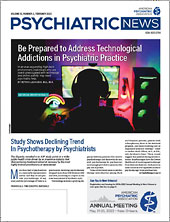A team led by researchers at the University of Washington has completed a fully remote clinical trial involving people with serious mental illness (SMI)—a population that can be hard to recruit and retain in clinical trials. The trial of CORE, a mobile app that teaches patients how to regulate dysfunctional thoughts, demonstrated how SMI patients can benefit from the use of digital health. The results were published in the Journal of Medical Internet Research (JMIR).
While many clinical studies have been conducted virtually—a trend that some say is likely to outlast the COVID-19 pandemic—the study of CORE took remote one step further by limiting staff involvement with the study participants to tech support only, explained Dror Ben-Zeev, Ph.D., the director of the mHealth for Mental Health Program at the University of Washington School of Medicine. “Everything was driven by the participants,” he said.
To recruit study participants, the researchers used online ads. Adults with self-reported major depression, bipolar disorder, or schizophrenia who responded to the ads were directed to a study website, where they completed an online consent form and baseline mental health assessment. Any adult who owned a smartphone, was available for 60 days, and could complete the consent form was eligible to participate and was randomized to receive 30 days of access to the CORE mobile app or be placed on a 30-day waitlist. After 30 days, the waitlist group received the app while the other group lost access to the app. Automated text messages reminded the participants to log in at the 30-day and 60-day mark to complete more mental health assessments as well as questionnaires on the usability of the app.
The CORE app offers a range of game-like exercises to help individuals with SMI manage maladaptive thoughts about themselves or others. The app is designed to build confidence, improve self-care, and reduce self-stigma. Ben-Zeev noted that CORE is a transdiagnostic tool that can help people with a variety of conditions.
“People with depression and bipolar disorder may also hear voices,” Ben-Zeev explained. “Similarly, people with schizophrenia may also experience depression and other mood disturbances. It’s important to develop clinical interventions that are not siloed [to treat] just one category of disorders.”
Overall, 1,123 people signed up for the study, of whom 315 were eligible and randomized. The participants hailed from 45 different states and included many who were unemployed and/or homeless. “With a standard clinical trial, you are primarily recruiting people who are already engaged with the health care system—the patients who can see the ‘volunteers needed’ ads posted at clinics,” Ben-Zeev said. “With the online recruitment we achieved a much greater reach, and at a fraction of the cost.”
After 30 days, the adults who used CORE reported significantly greater improvements in their depression, anxiety, self-esteem, and perceived disability than the adults in the waitlist group. During the next 30 days, the waitlist group experienced similar levels of improvement in these categories, such that both groups had similar assessment scores after 60 days. Most of the participants reported satisfaction with the app and its ease of use.
“We are not advocating for a shift toward fully automated approaches as the preferred model [for clinical trials],” Ben-Zeev and colleagues wrote in JMIR. “However, what this study did demonstrate is that when technology is designed with the characteristics of the intended users in mind (i.e., in terms of functionality, accessibility, navigability, and content), deployment of specialty digital mental health tools that do not involve humans in the loop of care can also produce significant clinical benefits.”
The authors reported no funding for this study. ■
“A Smartphone Intervention for People With Serious Mental Illness: Fully Remote Randomized Controlled Trial of CORE” is posted
here.
A press release announcing the partnership between Alto Neuroscience and Cerebral is posted
here.
